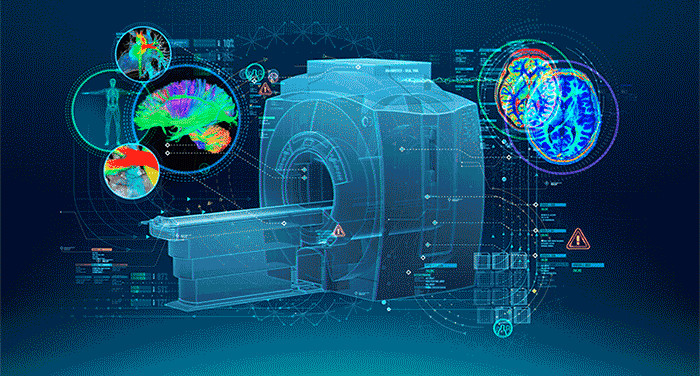
The Top 10 Reasons Transformation is the New Normal for Healthcare – Reason 6
Reason 6: Doctors will have algorithms as an extra set of eyes to see inside the human body
Inside the radiology reading room in the world-renowned Boston Children’s Hospital, pediatric neuroradiologists read 30,000-50,000 images of children’s brains a day.
These doctors are experts at analyzing the MRI scans of young children who show signs of developmental delay. This expertise is not trivial: children’s brains develop at such a rapid pace that reading their neuro scans is a much different exercise than reading those of an adult. In young children, what is actually normal brain development can often be misconstrued as disease, leading to unnecessary worry and follow on tests.
But only about three percent of radiologists specialize in pediatric neuroradiology. These experts are primarily found in major cities, at hospitals like Boston Children’s, leaving children in other communities more vulnerable to this follow on and worry. This population is also not trivial: in the U.S., one in six children have some sort of neurological delay.
This week we announced that GE Healthcare and Boston Children’s will co-create an algorithm that is designed to scan these images of children’s brains and help non-specialist clinicians everywhere to identify if there is disease – or not. The vision is for this pediatric MRI image database to run on machine-learning and to self-populate brain scans that can serve as reference points for normal developmental and disease states.
I spoke on a panel with Dr. Robertson, radiologist-in-chief at Boston Children’s, about this topic at the Radiological Society of North America (RSNA) Conference this week, where the full power of radiologists and the technology at their fingertips is on display. We’re proud to be here.
To understand the far-reaching impact of these efforts, consider a parallel challenge. Radiologists in general are extremely skilled at interpreting and identifying disease in adult scans, whether for example the lungs of a trauma patient are collapsed or if there is internal bleeding that requires immediate action. But of the thousands of x-rays sent to them to read a day, a large number turn out to be normal and the few that do reflect conditions requiring immediate treatment could be anywhere in their queue, waiting quietly to be read, delaying patient care.
That’s why we’re also collaborating with UC San Francisco (UCSF) to create a deep-learning library of algorithms that will review the images in a radiologists' queue and prioritize the images requiring urgent action. These algorithms will be available to providers around the world, so once again clinicians of any level of expertise can access the same new knowledge and insights.
By 2020, we’ll have hundreds of similar apps in the GE Health Cloud.
What we are saying is not just that that digital health is the future. We are saying that digital industrial in healthcare will finally answer the age old challenge of cost, quality and access. For the children who need brain scans in rural areas without specialists, for the highly-skilled radiologists who need more eyes and time to effectively prioritize the thousands of scans they need to read a day.
At GE Healthcare we’ve spent a century in the medical field, working alongside hospitals in radiology and exam rooms around the world. We’ve seen the ebbs and flows of the industry and have brought some of the most familiar medical technologies to life – x-ray, mammography, MRI. We look at how digital and industrial, software and hardware, machines and learning, are all combining and we know this is the real deal. This is the new normal.
This permeates every aspect of health and medicine, and beyond. This is reason 6.
Senior Biomedical Engineer at TechnoRad
7yWonderful, congratulations.
Clario R&D Manager. Founder & Director, Medimsight.
7yCongratulations for the article. We are more than happy to see that one of biggest companies want to come into the direction that Medimsight started more than 4 years ago. We'll be always open for collaborating because to make personal healthcare a reality now all the industry needs to get involved.
Exploration Geologist , Silvaculture
7yhttps://www.facebook.com/JusticeforJohnJLayes/
Global Product Marketing Director at GE Healthcare
7yThanks for sharing John and I look forward to many powerful stories to come as these systems change the lives of children not just in critical access points, but in all care settings in the years to come. What I have heard from all clinicians I have shadowed is that a dark thought that always hangs over them is "What have I missed?" I often wonder why the application of AI techniques has been so long in coming in healthcare? For instance, I worked on pathology screening systems in the early 90's which guided pathologists to slides and areas of slides for more intense human screening. While those types of wins push us forward a step at a time, the thing I look forward most to at GE healthcare is in deploying these types of AU tools across the enterprise, linked into all the clinical systems so as to be able to scan the holistic patient. This will truly create a leap forward in care.
Looking to buy an SMB | Entrepreneur with professional experience in B2B Business Growth & Finance
7yMaira Couto Rodrigues Lopes, MD, BBA, MBA